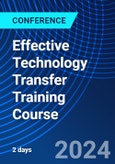Technology transfer (TT) is an increasingly important part of the pharmaceutical industry, with companies expanding the use of third parties for both development and manufacture.
There are few formal guidelines around this subject, but regulators expect companies to get it right for both internal and external transfers. Poorly run transfers can be costly and impact product quality, whereas well-run transfers bring business benefits and assure product quality.
Attending this highly practical course will give participants the tools to help guide them through achieving successful transfers. It is applicable to those making transfers from development to commercial, from commercial to commercial, for scale-up, analytical methods or for ‘virtual’ companies.
The programme covers pharmaceutical products, including ATMPs and combination products, but does not include medical devices.
Benefits of attending:
- Understand that technology transfer (TT) is part of the product life cycle, supported by the pharmaceutical quality system
- Know where TT is covered in ICH, FDA, EU, WHO and PIC/S guidelines
- Learn the key steps for successful transfers
- Know how to engage sending and receiving units (SU and RU) for TT
- Understand how product and process understanding enables TT
- Apply tools such as quality risk management and clarify risks involved in TT
- Understand how change should be handled, eg facility and equipment differences between SU and RU; scale-up
- Learn how analytical method transfers are an integral part of TT
- Recognise how TT impacts a wide range of companies from innovative to generic, including development, manufacturing, major corporations and ‘virtual’ companies
- Realise how significant business benefits emerge from successful TT
- Understand TT for pharmaceutical products, including combination products and ATMPs
Certifications
- CPD: 12 hours for your records
- Certificate of completion
Agenda
Day 1
- Regulatory guidance and business drivers for TT
- ICH Q10
- Exercise 1 - What Makes a Successful TT?
- Industry guidance for sending and receiving units (SU and RU)
- Knowledge
- What do SU and RU need?
- Exercise 2: Knowledge
- Science and risk-based approaches - part one
- Science and risk-based approaches - part two
- Equipment and utilities
- Exercise 3: Equipment at SU and RU
- Quality risk management
Day 2
- Project management steps for TT - part one
- Exercise 4 - Case Study - Fishbone for TT
- Project management steps for TT - part two
- Exercise 5: Case Study - Organising TT
- Validation and qualification
- Exercise 6: SU And RU
- Analytical method transfer - part one
- Analytical method transfer - part two
- Enabling successful TT - ‘softer’ issues
Speakers

Mr Bruce Davis,
Associate ,
NSF HealthsciencesBruce Davis runs his own training/consultancy company for science and risk based approaches to Engineering and Process Validation (PV), Quality by Design (QbD), Quality Risk Management, GMP for Engineers and other related topics. He has run many training events for companies both in the UK and internationally and is often invited to speak at international conferences.
He is past Chair of ISPE International Board of Directors and led their case study for practical implementation of QbD. He co-chaired the team updating their Technology Transfer (TT) Guide and carries out training for them and other organisations.
He is a professional engineer and has many years’ experience in the pharmaceutical industry and a wide international knowledge, and understanding of current regulatory approaches in the above topics for both US and EU.
He previously worked at AstraZeneca, where he had a number of responsibilities, including managing international engineering, facilitating QbD and leading changes to qualification practices.
He played a leadership role to set up De Montfort University’s MSc distance learning course in QbD.
He is an Associate to NSF Healthsciences, and for them has carried out consultancy and training in the above topic areas, and also for driving down human error.
Who Should Attend
This seminar will be of particular interest to all those from the pharmaceutical industry working in:
- Development
- Manufacturing
- Engineering
- Quality
The following personnel from the pharmaceutical and biopharmaceutical industries will also find it beneficial:
- Pharmacists
- Scientists
- Engineers
- Quality assurance professionals
- Quality control managers
- Late-stage product and process development engineers, scientists, pharmacists
- Technology scale-up and transfer managers
- Validation and qualification specialists
- Risk management specialists
- Operation managers









